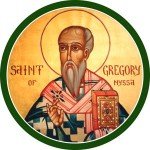 In the fourth century, Gregory of Nyssa was asked a difficult question about children who die young. The ascetic who asked this question was wondering what could really be achieved by his spiritual labors, when he knew for sure that he was going to commit sins that would hinder his entrance into the kingdom. So it seems like the child who died young was better off. Gregory’s answer reveals the basic orientation of Eastern Theology. He said, the human condition in the next life is not primarily a matter of justice, reward and punishment. God’s aim is rather to fulfill the purpose for which he created human beings, namely to participate in God’s life. The earthly life is for development and growth for this eternal communion. From this perspective it becomes truly understandable that according to Irenaeus, God originally intended that humans would enter into Theosis through a natural process of growth. This process would have involved an education in love, a free collaboration with God. As we have seen, a synchronicity between man’s free will and God’s loving opportunities and help. Unfortunately, sin – that is man’s self-centeredness – deflected humanity from this path and disrupted God’s purposes. Does this mean that God made a mistake in the initial design of humankind? No!
In the fourth century, Gregory of Nyssa was asked a difficult question about children who die young. The ascetic who asked this question was wondering what could really be achieved by his spiritual labors, when he knew for sure that he was going to commit sins that would hinder his entrance into the kingdom. So it seems like the child who died young was better off. Gregory’s answer reveals the basic orientation of Eastern Theology. He said, the human condition in the next life is not primarily a matter of justice, reward and punishment. God’s aim is rather to fulfill the purpose for which he created human beings, namely to participate in God’s life. The earthly life is for development and growth for this eternal communion. From this perspective it becomes truly understandable that according to Irenaeus, God originally intended that humans would enter into Theosis through a natural process of growth. This process would have involved an education in love, a free collaboration with God. As we have seen, a synchronicity between man’s free will and God’s loving opportunities and help. Unfortunately, sin – that is man’s self-centeredness – deflected humanity from this path and disrupted God’s purposes. Does this mean that God made a mistake in the initial design of humankind? No!
What then is the effect of the Fall in eastern theology? Rather than thinking in terms of Augustine’s transmittal of corrupted nature from generation, Eastern thought focuses on two interrelated effects of the Fall: physical death and the obscuring or distortion of the image of God. Adam’s sin was a personal choice and act, not a collective sin nor a “sin of nature”. Hence, inherited guilt is impossible. The consensus of the Greek Fathers, especially of our Fathers John Chrysostom, Cyril of Alexandria, Athanasius the Great, Gregory of Nyssa and Maximos Confessor, emphasize this critical point quite often.
We must remember that we humans see all things in time. The Jewish nation, in the formulation of Genesis, tried to come to some understanding why life on earth is as it is. Moses, inspired by God, suggests that all of our difficulties began when the first couple to become like God, the Creator. Thy ate of the tree of truth and knowledge. They are cast out of the Garden because of this. This is a story that tried to help people understand why life is the way that it is, including the great mystery of death.
As stated in this article last week, humans were never created perfect. There could be no growth or free will if they were. We are involved in an eternal process of birth-growth-death-birth!
